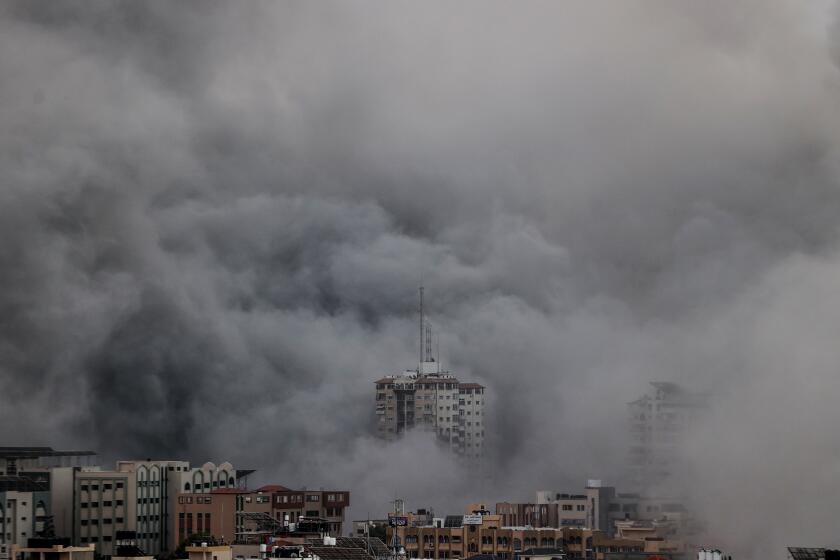What Biden’s staunch support for Israel’s war in Gaza will cost America

- Share via
The Biden administration’s unconditional support for Israel’s response to the Oct. 7 Hamas attack threatens U.S. national security interests — not only its economic and security interests in the Middle East but also its strategic competition with China and its advocacy for Ukraine’s independence.
On Nov. 9, President Biden told reporters there is “no possibility” for a cease-fire in Gaza as reports of the catastrophic conditions there flooded headlines. United Nations officials have described the onslaught by Israeli forces on the besieged enclave as a “crisis of humanity” and a “graveyard for children,” with more than 11,000 Palestinians killed, tens of thousands injured and more than 1.5 million displaced. Much of Gaza’s already-crumbling infrastructure has been damaged or destroyed.
Republicans are furious that Michigan Democrat Rashida Tlaib has called for a cease-fire and hasn’t walked in lockstep with establishment views.
Every U.S.-made missile dropped on Gaza’s besieged population along with America’s tepid response to the war will damage U.S. standing in the region and around the world for years to come. Many are horrified by the U.S.’ inability to take a meaningful position in favor of immediately stemming the bloodshed, preventing an expanded regional conflict and protecting the rules-based order. The world is looking to the U.S., Israel’s closest ally and financial and military benefactor, to take a morally consistent position.
Gaza hospitals are collapsing. As a mother there, I wonder why we bring children into this world if they will suffer.
As millions continue to take to the streets in protest across Arab and Muslim countries and around the world, American diplomats report the U.S. position is seen as “material and moral culpability in what they consider to be possible war crimes.”
They warn that the U.S. “is losing us Arab publics for a generation,” a sentiment visible to anyone reading the “Arab street,” either through social media or on the ground. Images of empty McDonald’s and Starbucks locations abound from Tunisia to Kuwait as a grassroots rejection of American brands and disillusionment with American policy toward the conflict.
Gaza’s techies were dreamers and builders. After Israel’s bombs, their stories shatter my heart
The Palestinian coders and techies I worked with built bridges to Silicon Valley. Amid Israel’s bombing, their vision of a new future for Gaza is crushed.
Meanwhile, China, which has advocated for a cease-fire, is not missing an opportunity to portray itself as a supporter of Palestinians. The superpower — accused of genocide and crimes against humanity for its oppression of the minority Uyghur population — is positioning itself as a champion of Palestinians, which resonates with Arab audiences against a backdrop of feeble American attempts to alleviate the suffering there.
In his critique of Israel’s bombardment of Gaza, Chinese Foreign Minister Wang Yi said: “The injustice to Palestine has dragged on for over half a century. The sufferings that plagued generations must not continue.” While the U.S. focuses on competition with China, it is fast losing ground because of the Israeli-Palestinian conflict.
A Times special correspondent in Gaza offers a personal account of living in a place where nowhere feels safe.
Last year, Biden outlined the defining principles of his policy toward the Middle East, advocating for a rules-based order: “The United States and each of the countries around this table are an essential part of that order because we reject the use of brute force to change borders.” One would be hard-pressed to find an Arab who doesn’t believe that Israel has been using brute force to change the status quo in the occupied Palestinian territories and using the latest escalation to further entrench its occupation of Gaza.
Biden went on to affirm that the U.S. will not “tolerate efforts by any country to dominate another in the region through military buildups, incursions and/or threats.” While Biden was pointing fingers at Iran, the Arab world feels overwhelmingly more threatened by Israel than it does by the Islamic Republic. In fact, the U.S. did little as the current right-wing government was elected in Israel, emboldening extremist settler attacks on Palestinians and regularly inciting violence against them.
Moreover, the Biden administration has not hesitated to prioritize the so-called Abraham Accords as an effort for “regional integration,” while failing to address the root causes of the Israeli-Palestinian conflict. Brokered by the Trump administration, the agreement normalized diplomatic ties between Israel and Arab nations, including the United Arab Emirates, Bahrain and Morocco. Regional economic integration, with all the benefits it can bring, cannot be a substitute for addressing festering regional conflicts such as the Israeli-Palestinian one.
In September 2022, Biden declared, “The United States will always promote human rights and the values enshrined in the U.N. Charter.” Based on assessments by almost every major human rights organization and international body, Israel has been consistently violating the human rights of Palestinians in the occupied territories and its own Arab citizens. Since the Oct. 7 Hamas attack on Israel, both parties have engaged in acts that will be investigated as war crimes, yet only one is an American ally being funded and supported politically, financially and militarily by the U.S.
Across the Arab world and Global South, American statements about respect for human rights and the laws of war in the context of the Russia-Ukraine war are being juxtaposed against staunchly pro-Israeli positions when it comes to the war on Gaza. The war has forced even close allies of the U.S. to call out American double standards.
In a speech in Cairo in late October, King Abdullah II of Jordan described how Arabs are reading the Western response: “Our lives matter less than other lives. The application of international law is optional, and human rights have boundaries — they stop at borders, they stop at races and they stop at religions.”
Biden’s words — and inaction — will ring in Arab ears for decades to come as American complicity in the carnage in Gaza will define the region’s relationship with the United States for the foreseeable future.
Tuqa Nusairat is the director for strategy, operations and finance at the Atlantic Council’s Middle East Programs in Washington.
More to Read
A cure for the common opinion
Get thought-provoking perspectives with our weekly newsletter.
You may occasionally receive promotional content from the Los Angeles Times.













